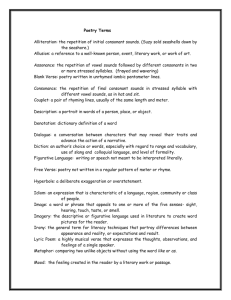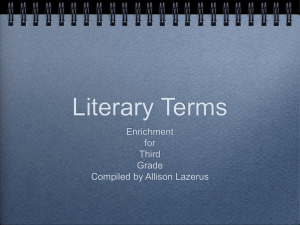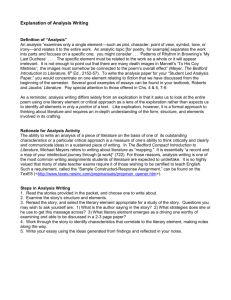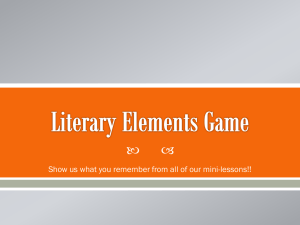10th Grade Literary and Poetry Terms
advertisement
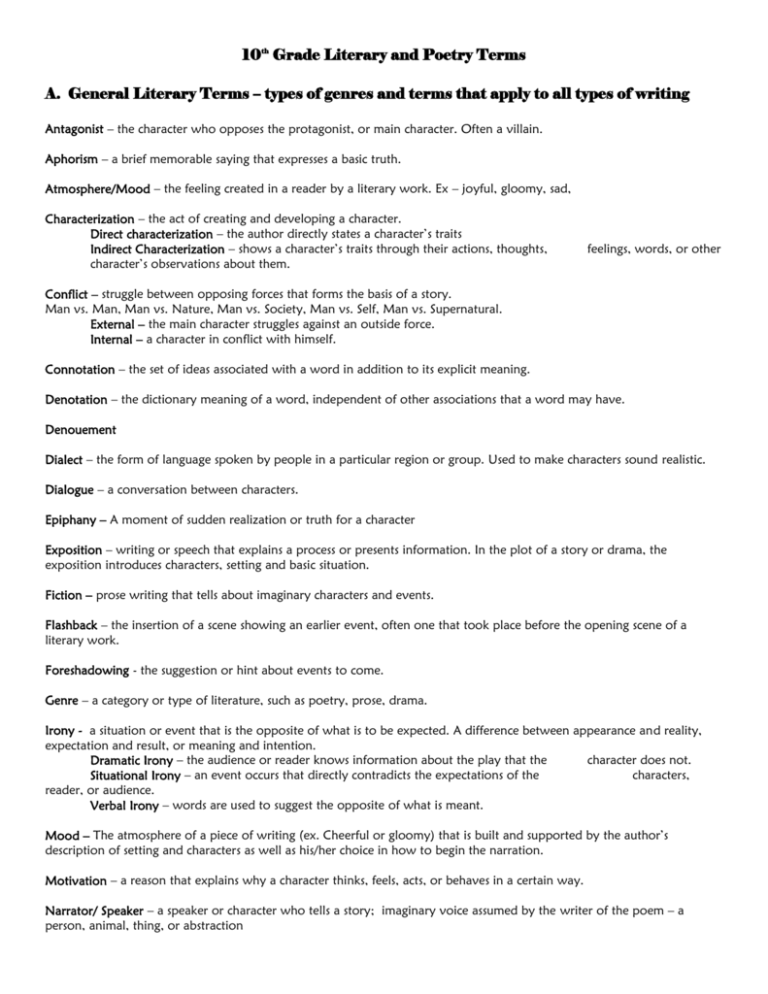
10th Grade Literary and Poetry Terms A. General Literary Terms – types of genres and terms that apply to all types of writing Antagonist – the character who opposes the protagonist, or main character. Often a villain. Aphorism – a brief memorable saying that expresses a basic truth. Atmosphere/Mood – the feeling created in a reader by a literary work. Ex – joyful, gloomy, sad, Characterization – the act of creating and developing a character. Direct characterization – the author directly states a character’s traits Indirect Characterization – shows a character’s traits through their actions, thoughts, character’s observations about them. feelings, words, or other Conflict – struggle between opposing forces that forms the basis of a story. Man vs. Man, Man vs. Nature, Man vs. Society, Man vs. Self, Man vs. Supernatural. External – the main character struggles against an outside force. Internal – a character in conflict with himself. Connotation – the set of ideas associated with a word in addition to its explicit meaning. Denotation – the dictionary meaning of a word, independent of other associations that a word may have. Denouement Dialect – the form of language spoken by people in a particular region or group. Used to make characters sound realistic. Dialogue – a conversation between characters. Epiphany – A moment of sudden realization or truth for a character Exposition – writing or speech that explains a process or presents information. In the plot of a story or drama, the exposition introduces characters, setting and basic situation. Fiction – prose writing that tells about imaginary characters and events. Flashback – the insertion of a scene showing an earlier event, often one that took place before the opening scene of a literary work. Foreshadowing - the suggestion or hint about events to come. Genre – a category or type of literature, such as poetry, prose, drama. Irony - a situation or event that is the opposite of what is to be expected. A difference between appearance and reality, expectation and result, or meaning and intention. Dramatic Irony – the audience or reader knows information about the play that the character does not. Situational Irony – an event occurs that directly contradicts the expectations of the characters, reader, or audience. Verbal Irony – words are used to suggest the opposite of what is meant. Mood – The atmosphere of a piece of writing (ex. Cheerful or gloomy) that is built and supported by the author’s description of setting and characters as well as his/her choice in how to begin the narration. Motivation – a reason that explains why a character thinks, feels, acts, or behaves in a certain way. Narrator/ Speaker – a speaker or character who tells a story; imaginary voice assumed by the writer of the poem – a person, animal, thing, or abstraction Plot – the sequence of events that takes place in a literary work that includes characters and conflicts. Exposition, rising action, climax, falling action, resolution are parts of the plot. Point of View – the perspective or point from which the story is told. First person – narrator is part of the action Third person – narrator is outside the action Omniscient – narrator is all knowing about the characters Limited – narrator tells the thoughts and feelings of only one character. Prologue – introductory material before the first chapter, or in Greek theatre, before the first entry of the chorus. Protagonist – main character in a work of fiction, the one readers would like to see succeed. Repetition – use of any element of language, a sound, word, sentence, or phrase, more than once. Ex - alliteration, assonance, rhyme, rhythm, refrain. Resolution – end of the central conflict in a literary work. ( also called Denouement) Satire – A type of writing that uses humor to make fun of a social issue or to point out a greater social/political problem or issue. Setting – the time and place in which event occur in a literary work. Stereotype – A character that is so ordinary or unoriginal that the character seems like an oversimplified representation of a type, gender, class, or occupation. Suspense – feeling of curiosity or uncertainty about the outcome of events in a literary work. Symbol – anything that stands for or represents something else. Has its own meaning, but also represents an abstract idea. Theme – central message or insight into life that revealed through a literary work. A generalization about people or life. Tone – the attitude or viewpoint that an author shows toward his or her subject. Ex- serious, sympathetic, angry, indifferent, respectful… B. FIGURES OF SPEECH – can be found in ANY writing. These phrases and expressions make us think because they are not literal, they are imaginative! Allusion – a reference to a well known person, place, thing, event, literary work, or work of art. Ex- The reference to the lord of the flies being Beelzebub, in the novel Lord of the Flies. Hyperbole - exaggeration, an overstatement for the purpose of emphasis. Ex – It is so hot out that you could fry an egg on the sidewalk. Imagery - the use of description of figurative language to create vivid images, or word pictures that appeal to the senses. Exthe aroma of fresh baked chocolate chip cookies filled the room. Metaphor – comparison between unlike objects that does not use “like” or “as.” Oxymoron – combination of two contradictory words. Ex – deafening silence, jumbo shrimp, definite possibility, permanent substitute. Personification – applies human qualities to objects, ideas, or animals. Ex – The sun smiled down on the village Simile – comparison between two unlike things or ideas, using the words “like” or “as.” C. MODES OF WRITING Personal Expression - Expressing your thoughts, feelings, or experiences in pieces such as: Autobiography, Journal, Webpage/Blog, Anecdote Description - Creating a picture using imagery in written work such as: Observation, Remembrance, Character sketch Narration - Telling a true or fictional story Exposition: Giving Information - Providing information or explaining as in a(n): How to article, News Article or Summary Exposition: Making Connections - Comparing and contrasting, offering solutions to a problem, or explaining an opinion Persuasion/Argumentation - Trying to convince a reader to agree with you often found in: Letter to Editor, Advertisement or Persuasive Speech Reports - Summarizing the results of research including Full Research Paper or Multi-Media Presentation Creative Writing - Expressing your personal views and imagination in pieces including: Poetry, Drama/Skits, Short Stories, Lyrics Responses to Literature/Non-Fiction – These pieces often assess your ability to read deeply and critically and include: Literary Analysis, Thematic Essay, Exposition, Literary Journal, Author Letter, Critical Review D. DRAMA TERMS. Aside – a short speech delivered by an actor in a play, expressing the character’s thoughts. Monologue – a speech by one character while others are present Soliloquy – long speech expressing the thoughts of a character alone on stage. Tragedy – a work of literature, especially a play, that results in a catastrophe for the main character and arouses pity and fear in the audience/reader. Tragic Hero – evokes both pity and terror, is neither all good nor all evil, is of high birth, and whose downfall is through a weakness or error in judgment, a tragic flaw - usually hubris. Catharsis – “purgation” or “purification” of emotions of pity and fear which leaves the audience/reader relieved and elated. Hubris – excessive pride that causes the hero’s downfall, a tragic flaw Other Terms for Greek Drama: Prologue, Parados, Paean, Ode, Strophe, Antistrophe, Choragos E. SOUND TECHNIQUES Alliteration – the repetition of an initial, consonant, sound. Ex –Sally sells sea shells… Assonance – the repetition of vowel sounds followed by different consonants in two or more stressed syllables. Consonance – the repetition of similar consonant sounds at the end of accented syllables. Onomatopoeia – the use of words that sound like the things they name. Ex – bang, buzz, crackle, sizzle, hiss, roar, murmur, thud… F. POETRY TERMS Ballad – a song, transmitted orally, that tells a story Couplet – a pair of rhyming lines usually of the same length and meter. Dramatic Poetry – verse that presents the speech of one or more characters – like mini-dramas Elegy – a poem written in honor of someone or something upon its death Epic – a long narrative poem about the deeds of a god or hero Free Verse – poetry that lacks organized rhyme and rhythm Iambic Pentameter – a poetic rhythm pattern consisting of FIVE IAMBS (poetic feet of unstressed/stressed syllables). Shakespeare wrote in unrhymed iambic pentameter called Blank Verse. Lyric Poetry – highly musical poetry that expresses the thought or observations of a single speaker. These poems rely heavily on sound techniques. Narrative Poetry – a poem that tells a story – often it reads like a mini-story Ode – a long lyric poem, modeled after the songs of the Greek chorus. Refrain – a line, part of a line, or group of lines that is repeated in the course of a poem, sometimes with slight changes, and usually at the end of a stanza. Rhyme Scheme – a regular pattern of rhyming words in a poem. It is indicated by using different letters of the alphabet for each new rhyme. Rhyming Couplet – a pair of rhyming lines, usually of the same length and meter, and expressing a single idea. Scansion/Meter – the process of determining a poem’s rhythm pattern. Lines are broken into poetic feet (which all have one stressed syllable). Then the number of poetic feet are counted to determine the pattern (ex. Anapestic Tetrameter) Sonnet – 14 line, lyric poem usually written in rhymed iambic pentameter. Made up of 3 quatrains and a couplet and following the rhyme scheme abab cdcd efef gg. Stanza – formal division of lines in a poem, considered as a unit, often separated by spaces. Quatrain – 4 line stanza Sestet – 6 line stanza Octave – 8 line stanza

